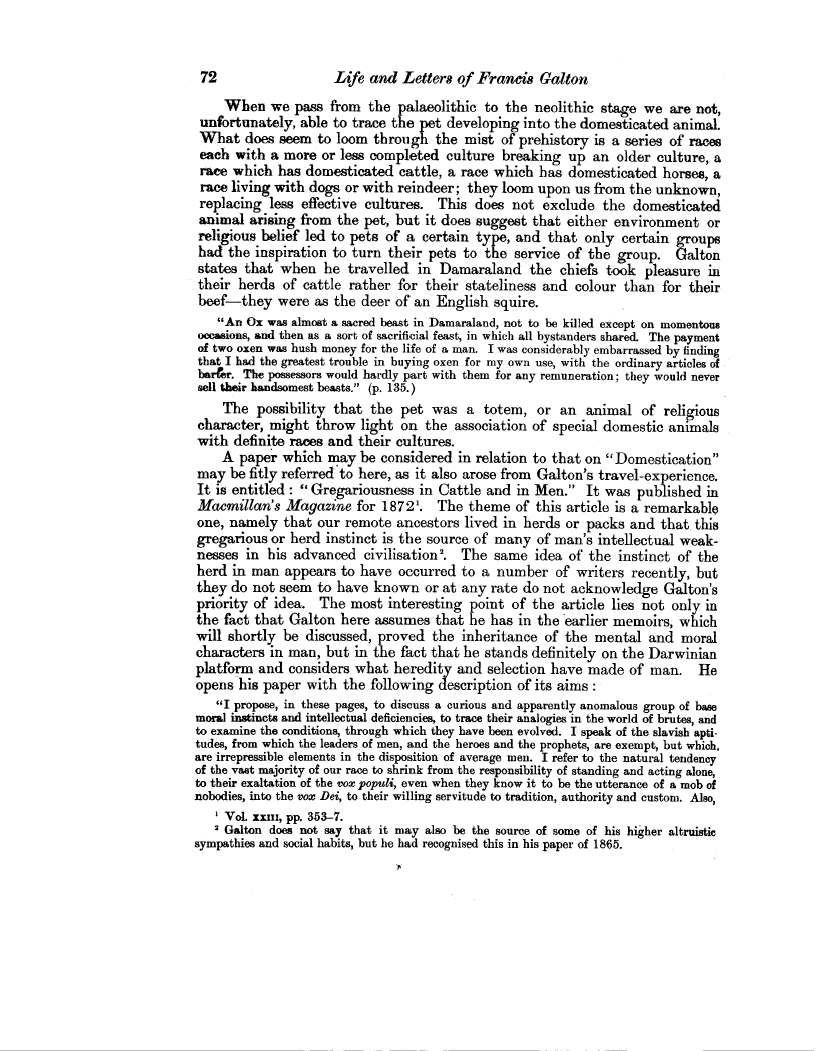72 Life and Letters of Francis Galton
When we pass from the palaeolithic to the neolithic stage we axe not, unfortunately, able to trace the pet developing into the domesticated animal. What does seem to loom through the mist of prehistory is a series of races each with a more or less completed culture breaking up an older culture, a race which has domesticated cattle, a race which has domesticated horses, a race living with dogs or with reindeer; they loom upon us from the unknown, replacing less effective cultures. This does not exclude the domesticated animal arising from the pet, but it does suggest that either environment or religious belief led to pets of a certain type, and that only certain groups had the inspiration to turn their pets to the service of the group. Galton states that when he travelled in Damaraland the chiefs took pleasure in their herds of cattle rather for their stateliness and colour than for their beef-they were as the deer of an English squire.
"An Ox was almost a sacred beast in Damaraland, not to be killed except on momentous occasions, and then as a sort of sacrificial feast, in which all bystanders shared. The payment of two oxen was hush money for the life of a man. I was considerably embarrassed by finding
that I had the greatest trouble in buying oxen for my own use, with the ordinary articles of barer. The possessors would hardly part with them for any remuneration; they would never sell their handsomest beasts." (p. 135.)
The possibility that the pet was a totem, or an animal of religious character, might throw light on the association of special domestic animals with definite races and their cultures.
A paper which may be considered in relation to that on "Domestication" may be fitly referred to here, as it also arose from Galton's travel-experience. It is entitled : " Gregariousness in Cattle and in Men." It was published in Macmillan's Magazine for 1872'. The theme of this article is a remarkable one, namely that our remote ancestors lived in herds or packs and that this gregarious or herd instinct is the source of many of man's intellectual weaknesses in his advanced civilisation 2. The same idea of the instinct of the herd in man appears to have occurred to a number of writers recently, but they do not seem to have known or at any rate do not acknowledge Galton's priority of idea. The most interesting point of the article lies not only in the fact that Galton here assumes that he has in the -earlier memoirs, which will shortly be discussed, proved the inheritance of the mental and moral characters in man, but in the fact that he stands definitely on the Darwinian platform and considers what heredity and selection have made of man. He opens his paper with the following description of its aims
"I propose, in these pages, to discuss a curious and apparently anomalous group of base moral instincts and intellectual deficiencies, to trace their analogies in the world of brutes, and to examine the conditions, through which they have been evolved. I speak of the slavish aptitudes, from which the leaders of men, and the heroes and the prophets, are exempt, but which, are irrepressible elements in the disposition of average men. I refer to the natural tendency of the vast majority of our race to shrink from the responsibility of standing and acting alone, to their exaltation of the vox populi, even when they know it to be the utterance of a mob of
nobodies, into the vox Dei, to their willing servitude to tradition, authority and custom. Also,
' Vol. xxui, pp. 353-7.
' Galton does not say that it may also be the source of some of his higher altruistic sympathies and social habits, but he had recognised this in his paper of 1865.

